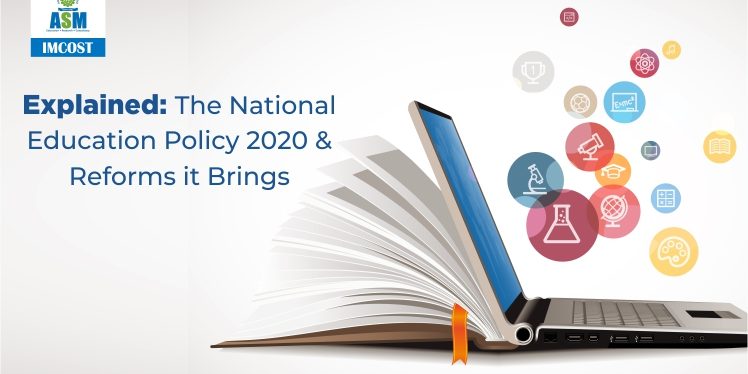On July 31st, 2020, the central government introduced the National Education Policy 2020 (NEP 2020), and experts believe it to be one of the most reformative education policies in recent times. There are major reforms and changes outline in schooling and higher education, intending to reduce stress on students and allowing them to pursue their interests and wider range of educational disciplines.
One of the biggest aims of the policy is to get more than 50% students into higher education. Theres also due importance given to education in the regional language. Many amazing reforms will change the Indian education system for the better. Lets take a look at the major reforms and what they mean to the future of education in India.
School Education Reforms
There are some major reforms in the school education sector. Education has remained the same for a long time, so the new changes are quite welcome.
Here are those reforms:
-
Education in Regional Language
Theres due importance given to the regional language. The new rules state that students will be taught the regional language or mother tongue till the 5th standard compulsorily. Schools can choose to extend this to the 8th standard.
-
Rote Education is Out –
Rote education created a generation of students who only memorised but did not learn anything. Now the focus will be on fundamental skills, cognitive skills, and soft skills.Even the exams will not tests a students rote but rather, their understanding of the subject.
-
ECCE –
Special attention will now be given to Early Childhood Care & Education. A special national curriculum is being prepared by the NCERT for childhood care for children below the age of 8. This curriculum is going to be a framework for everyone to follow.
-
Education in Essential Skills & Subjects –
Students will now be taught skills and subjects like evidence-based thinking, scientific temper, innovation, creativity, sports & fitness, health & education, logical reasoning, critical thinking, environmental awareness, design thinking, holistic health, water conservation, artificial intelligence, etc. Students will be taught these higher education skills and subjects right in their school education.
-
Changed Assessment Parameters –
Since rote education is out, the assessment parameters also need to be changed. Right from the school to the board examinations, students holistic development and competency will be assessed. Board exams will also be based on individual student interest.
-
Teachers Development Initiatives –
Recognising the teachers need to keep improving to provide international standards of education, NEP 2020 has outlined development opportunities for teachers at district, state, national and international levels. They will have access to resources that will help them develop their knowledge and education to the latest standards of education being provided around the world.
Higher Education Reforms
The Indian higher education system is only behind China in terms of size. There is a strong need to expand according to demand, and the new reforms are expected to do exactly that.
Here are major reforms in the higher education sector:
-
Reforms in Colleges in Universities –
Colleges and universities are the main areas of focus for NEP 2020. There are plans to have multidisciplinary colleges and universities in every district of the country. Curriculums will be revised along with pedagogy, assessment parameters, and students’ experience. Undergraduate education will be focused on making it holistic and multidisciplinary. Institutes and faculty will be autonomous.
-
National Research Foundation –
To make universities and colleges into research hubs, a National Research Foundation will be created. This body will be responsible for the funding of peer-reviewed research and research work in all the universities and institutes across the country.
-
World-Class Universities –
In the past, India was found to be lacking universities that were ranked well on the international level. Now, there are plans to create 20 institutes of international standards. Most of these institutes will be from the existing top institutes. Our top universities will be allowed to set up universities in other countries and similarly, international universities will be allowed to set up in India. The main aim is to increase foreign students in the country.
-
Access to Higher Learning –
There is going to be a substantial increase in scholarships at private universities to provide opportunities to the underprivileged students. These students will also have more access to higher education through open distance learning, online education, and open schooling.
-
More Holistic Less Rote –
Flexible and holistic education will be provided to create more well-rounded graduates. There will be less stress on rote education and more on arts education. Multidisciplinary universities will be required to have departments like languages, music, literature, Indology, dance, philosophy, art, theatre, economics, mathematics, pure & applied sciences, education, statistics, sociology, and sports.
-
Revamped Teacher Education –
Institutes providing substandard teacher education will be phased out in favour of multidisciplinary institutes with departments like neuroscience, psychology, sociology, Indian languages, arts, philosophy, literature, and history. This will be all done by an appointed regulatory authority. Also, the minimum degree required for the teaching profession will be a 4-year B. Ed degree course.
-
Transforming Higher Education Regulatory Authorities –
So far, there has been a disparity between the higher education regulatory authorities in the country. Theres a conflict of interest and power struggles in these bodies, many of which made setting up higher education institutes difficult in the country. This will all change with the right distribution of power and authority. Rules for setting up institutes of higher learning will also be eased.
-
Renewed Focus on Professional Education –
NEP 2020 calls for improvement of education in subjects under legal, health, and technical disciplines to match international standards. Stand-alone universities and institutes will have until 2030 to introduce multidisciplinary courses, or they can tie with other universities and institutes specialising in other disciplines to form a cluster of varied and holistic education.
The NEP 2020 is being hailed as one of the most reformative education policies the country has ever seen. There are going to be major changes in the coming years and the main beneficiaries of these changes are going to be the students of the country. The NEP 2020 looks to put Indian education on par with international education, and develop India into one of the major education hubs in the world.




